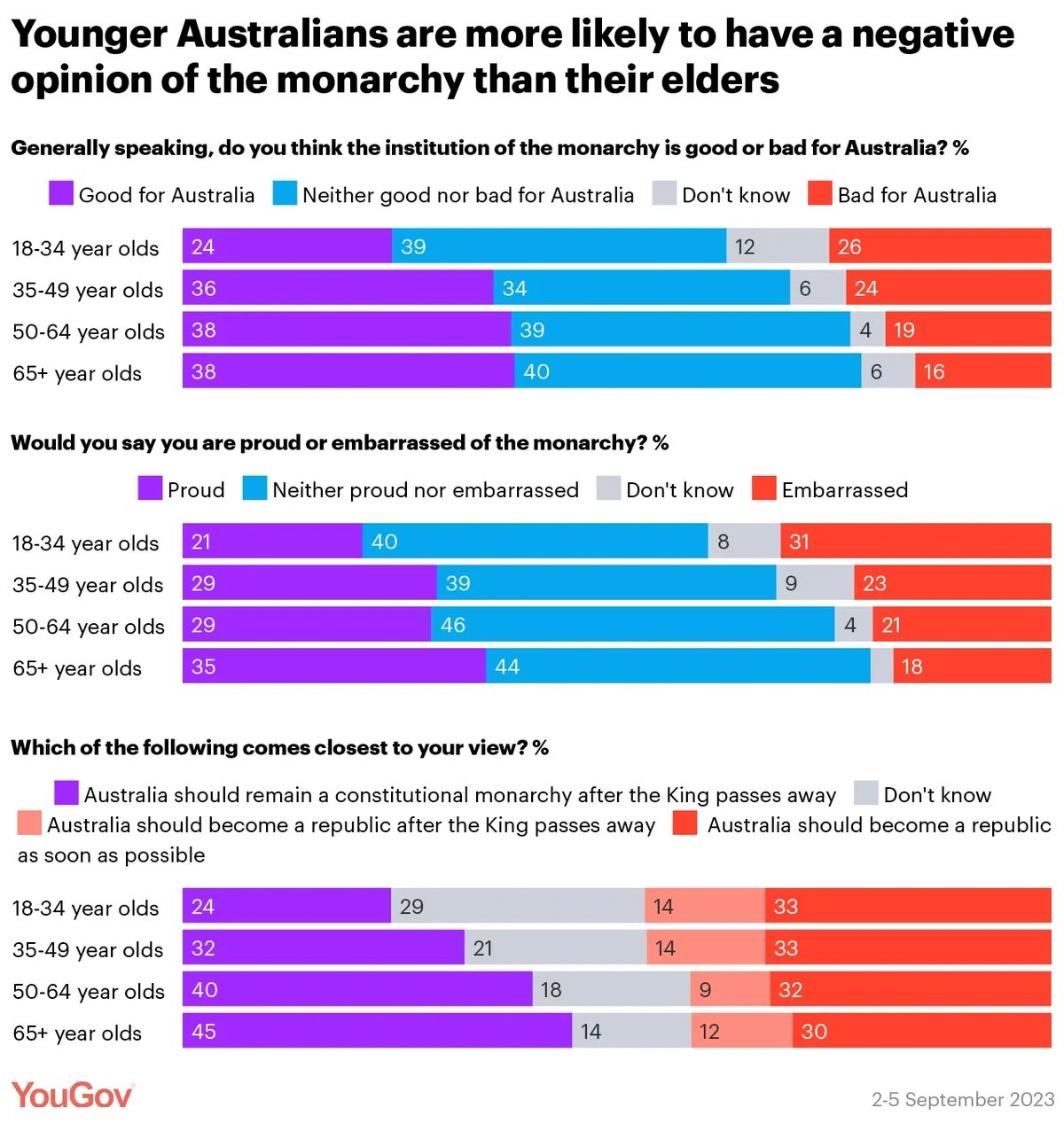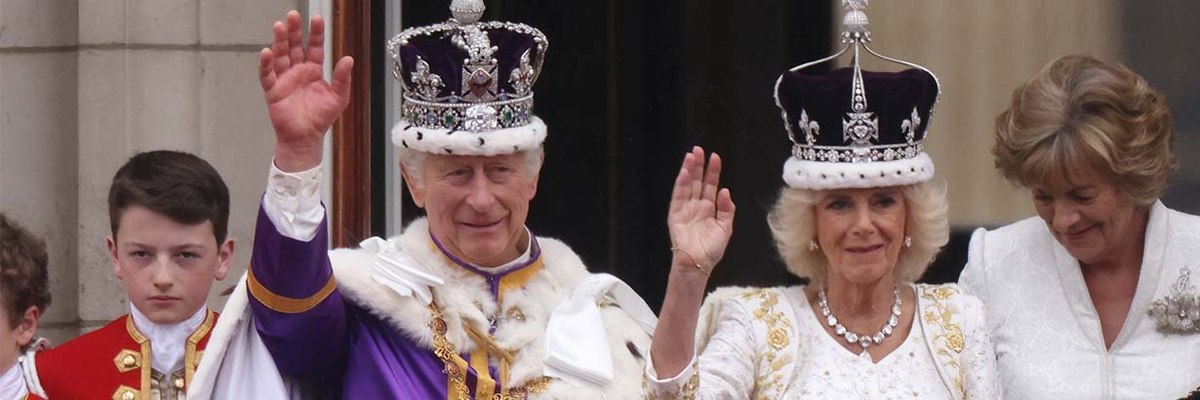While Australians are divided on whether the country should remain a constitutional monarchy, the King is more popular than any Australian politician
This Friday marks the first anniversary of King Charles’ ascension to the throne. On this milestone, a new YouGov survey examines Australians’ attitudes to the monarchy and the royal family.
Should Australia remain a constitutional monarchy or become a republic?
One in three Australians want the country to become a republic as soon as possible (32%). A similar number want to remain a constitutional monarchy for the long term (35%). In between are 12% of Australians who want to kick the republican can down the road, saying that the country should only become a republic once the King has died.
These figures represent a 12pt increase in sentiment for a swift transition to a republic since a previous YouGov poll a year ago. However, that shift seems to be coming exclusively from those whose opinion had been to wait for the monarch to die before becoming a republic: back then, 24% had said Australia should become a republic once the Queen dies. The proportion of Australians who want to continue as a constitutional monarchy for the long term is unchanged.
Those who want Australia to become a republic as quickly as possible are the most likely to feel strongly about the issue, with 79% saying so, compared to 65% who want to remain a constitutional monarchy long-term, and just 54% of those who want Australia to become a monarchy only after King Charles has passed away.
How do Australians feel about the monarchy?
Australians are more likely to think that the monarchy is good for the country (34%) than bad (21%) – although the most common opinion is that the impact is neither good nor bad (38%).
Australians tend to be satisfied with the role the monarchy currently has in Australia, at 43%. This compares to 35% who want to see them play less of a role, and 13% who want to see them to be more involved.
More than a quarter of Australians say they are proud of the monarchy (28%), slightly higher than the 23% who are embarrassed by it. Again, the inbetween option is highest – 42% say they are neither proud nor embarrassed.
Do Australians think the monarchy is here to stay?
Australians do tend to expect that the country’s time as a constitutional monarchy is destined to end, however. Half (51%) think Australia won’t be a constitutional monarchy in 100 years, compared to only 19% who think it will.
Whether or not King Charles will prove to be the final monarch to rule over Australia is divisive: 33% think he will be, while an identical 34% say he won’t be.
How popular is the royal family?
While Australians may be divided on the institution of the monarchy, the royal family are still popular (with notable exceptions). A majority (54%) say they have a positive view of “the royal family in general”, compared to 36% who have a negative view.
And while Australia’s constitutional status may be in question, on a personal level, King Charles is more popular than any Australian politician. Half (50%) have a positive opinion of the King, compared to 40% with a negative view, giving a net score of +10.
The next in line to the throne – Prince William – is substantially more popular still: fully 69% of Australians have a favourable view of the Prince of Wales, with only 20% having a negative view.
Even those who want Australia to become a republic as soon as possible have a positive opinion of Prince William, by 52% to 38%. (By contrast, King Charles is unpopular among this group, with 60% having a negative view and only 31% a positive one).
The politician that the largest number of Australians have a positive opinion of is prime minister Anthony Albanese, with 47% having a favourable view and 44% an unfavourable one (giving a net score of +3).
Foreign minister and senate leader Penny Wong and senator Jacqui Lambi have slightly higher net scores than Albanese (both are on +8), but this is somewhat a factor of them being slightly less well known (22-24% are unfamiliar with them, compared to Albanese’s 10%).
Catherine, Princess of Wales, Princess Anne, and Prince Edward also prove to be more popular than Australian politicians. Unsurprisingly Prince Andrew does not, and Camilla, Queen Consort, and Prince Harry and wife Meghan also prove to be unpopular overall.
The younger generation are more negative about the monarchy than their elders
YouGov UK research shows that in Britain there is an enormous generational divide over the monarchy. There, the older generations are staunchly pro-monarchy, while the younger generation is divided.
While younger people in Australia are likewise less enthusiastic than their elders about the monarchy, this is in the context of Australians of all ages being less positive about the monarchy than their British counterparts, so the gap between young and old is less pronounced here.
The youngest Australians (18-34 year olds) are notably less likely to feel that the monarchy is good for the country (24%) than other age groups (36-38%). They are similarly more likely than the oldest Australians (those aged 65 and above) to think that the monarchy is bad for Australia (24% vs 16%).
When it comes to Australia’s constitutional status, young people are less likely to want to stay as a monarchy long term, at 24% compared to 45% among the oldest age group. They are also more likely to be uncertain, at 29% versus 14% of the oldest Australians – relatively similar numbers of young and old support either becoming a republic as soon as possible (33% and 30%, respectively) or once King Charles has died (14% and 12% respectively).

Methodology
YouGov interviewed 1,203 Australian citizens online between 2-5 September 2023. YouGov, a member of the Australian Polling Council, supports its goals of greater transparency in Australian polling, and complies with its Code of Conduct. A methodology statement will be available within two days on our statements page










